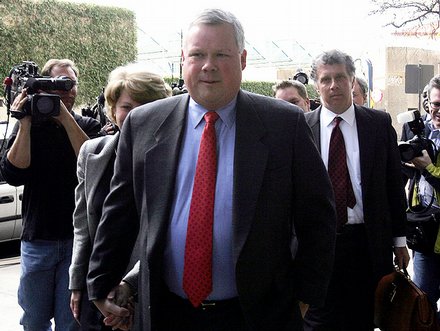 The Wall Street Journal’s ($) John Emshwiller reports that former Enron chief accountant Richard Causey is currently negotiating with Task Force prosecutors regarding a possible plea bargain under which he would testify against his former bosses, Ken Lay and Jeff Skilling, in the upcoming Enron legacy criminal trial scheduled to begin in Houston federal court on January 17, 2006. A subsequent WaPo article on Causey’s plea bargain negotiations is here and the Chronicle story is here.
The Wall Street Journal’s ($) John Emshwiller reports that former Enron chief accountant Richard Causey is currently negotiating with Task Force prosecutors regarding a possible plea bargain under which he would testify against his former bosses, Ken Lay and Jeff Skilling, in the upcoming Enron legacy criminal trial scheduled to begin in Houston federal court on January 17, 2006. A subsequent WaPo article on Causey’s plea bargain negotiations is here and the Chronicle story is here.
The gist of Emswiller’s piece is that the Task Force is focusing on statements that Causey made to investigators early in the Enron criminal investigation to the effect that Enron had adequate internal controls in place to limit the risk of Andrew Fastow using his position as both Enron’s CFO and as the control person in various special purpose entities doing business with Enron to harm the company.
The prosecution contends that Causey’s statements to investigators — as well as Lay and Skilling’s similar public statements regarding the controls — were false and that the executives knew that the controls on Fastow’s dual positions were inadequate.
The three executives contend that Enron’s internal controls were both extensive and reasonable, but that no control can absolutely prevent someone such as Fastow from using his position to perpetrate a fraud on the company if he is intent on doing so.
Frankly, neither Causey’s plea bargain negotiations nor Emshwiller’s story are particularly surprising. Given that Causey is facing the equivalent of a life sentence if he chooses to defend himself without access to his full net worth in a case in which much of media (including Mr. Emshwiller — see his Enron book, 24 Days: How Two Wall Street Journal Reporters Uncovered the Lies that Destroyed Faith in Corporate America) has already concluded that he is guilty, it is understandable that Causey would at least explore all options that would hedge that substantial risk of loss.
Likewise, the Enron Task Force has frequently used the media throughout its dubious handling of the criminal investigation of Enron to pressure former Enron executives into questionable plea bargains.
By the way, Emshwiller has already published questionable conclusions about Enron that are clearly adverse to the three former executives. Moreover, through his book, he has a financial interest in seeing that even his most dubious conclusions are confirmed during the upcoming trial.
Why on earth is a media publication of the Wall Street Journal’s caliber having someone with such an obvious conflict of interest covering the Lay-Skilling-Causey trial?

Will Causey Switch Sides in the Enron Conspiracy Trial?
Like the fifth Beatle, former Enron Chief Accounting Officer Richard Causey has been the unknown defendant in the upcoming Enron conspiracy trial. Unlike codefendants Ken Lay and Jeffrey Skilling, who as CEOs of the company had high-profile and highly …
Causey may still be working on a plea deal
Fallen Enron Chief Accounting Officer Rick Causey is still talking to prosecutors about a possible plea deal, which could dramatically change the nature of the Big Trial next month. The news isn’t that surprising, nor is the notion The Wall…
A plea for Causey?
Hope everyone who celebrated Christmas yesterday had a good one. The one piece of news from the day was this…